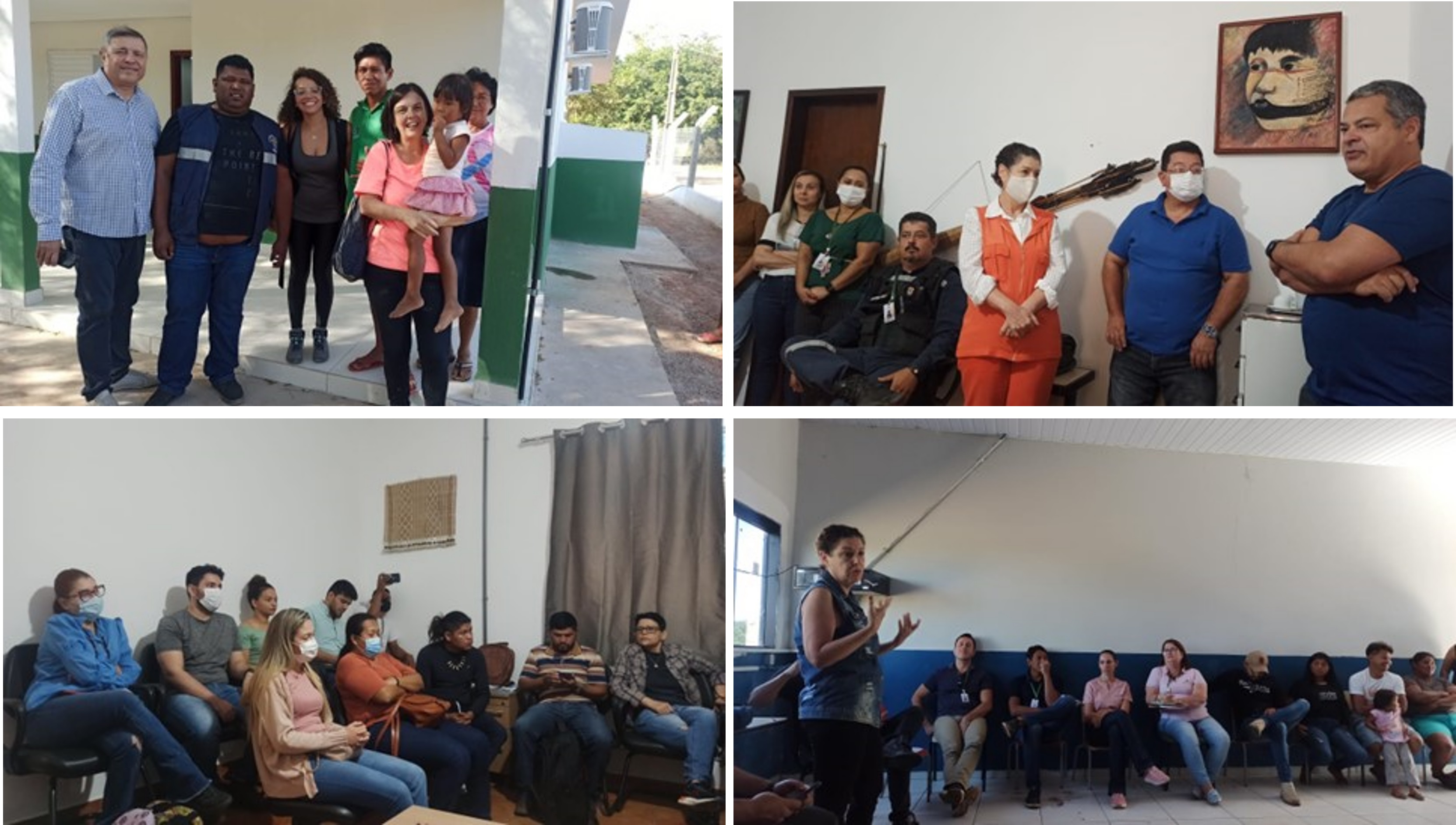With the main purpose of supporting the structuring of the Indigenous Health Virtual Health Library (VHL) and the development of its information products and services, a team from BIREME/PAHO/WHO visited two indigenous villages and the central coordination of the Special District for Indigenous Health (DSEI) of Cuiabá, in the state of Mato Grosso, Brazil, to see the local reality, the needs for access to and use of information and some of the main challenges that can support their practices and decisions in health.
In this sense, the choice of visiting DSEI Cuiabá was suggested by the appropriate conditions for carrying out the field research activity, including logistics, cultural diversity and characteristic ethnicities. The coordinator of DSEI Cuiabá, Mr. Audimar Rocha Santos, was responsible for organizing and indicating the places visited: Aldeia Gomes Carneiro (Eboi – Bororo ethnicity), Aldeia Formoso (Paresi ethnicity), and the central coordination of DSEI Cuiabá.
Data collection was carried out through interviews. The BIREME/PAHO/WHO’s Management of Production of Information Sources/Cooperative Information Services (PFI/SCI), represented by Verônica Abdala, Juliana Sousa, and Elisabeth Biruel, carried out eight individual interviews and eleven in groups with two to four professionals, with an average duration of forty minutes each. Before starting the interviews, the team talked with some indigenous people living in these villages and with health professionals, about general topics related to daily life or work in the villages.
On the second day of the visit, activities were carried out at the headquarters of the DSEI Cuiabá Coordination, where the indigenous health teams from the centers in Cuiabá, Rondonópolis, and Comodoro were gathered. About twenty indigenous health professionals, including nurses, doctors, dentists, technicians, and health agents, in addition to the coordination team participated in the interview.
According to Verônica Abdala, the visit to the villages and the interaction with the health professionals, with the DSEI Cuiabá coordination team and with the indigenous people made it possible to know the context of the Health professionals’ work in the care and promotion of indigenous health. The previously defined objectives have been met.
For Juliana Sousa, the mission made it possible to recognize the needs and challenges faced in the day-to-day of healthcare in the villages, and to get closer to the local reality, in addition to having lived an incredible experience for professional and personal practice.
According to Elisabeth, the mission was a pleasant experience that allowed us to look at the diversity of indigenous culture and see the challenges faced by health professionals, in which the interviews narrowed the real needs of aligning knowledge translation strategies to meet local expectations.
Overall, the team highlights:
– Internet is arriving in the villages, but access is still very limited; and mobile telephony does not have a stable signal;
– Health professionals work in the care of the indigenous population with limited resources and need to travel between villages over long distances on a dirt road. They alternate between working for 15 days and taking 15 days off. Some professionals are indigenous;
– Some professionals are doing a master’s degree or specialization, and commented that they participate in refresher courses. But, they reported that they are not used to searching for information on the internet, they rarely know the VHL sites. Only the website of the Open University of the Unified Health System (UNASUS) was cited by more than five of the professionals, still a rough estimate, without analyzing all the responses;
– Didactic and audio-visual materials as training instruments that are accessible offline, as well as sharing of personal experiences, were recurrent in several of the interviewees’ testimonies. Folder, posters, and tutorials with images about recurring problems were indicated as didactic resources and health promotion tools for application in loco, with the indigenous people; and
– The main problems that affect the health of indigenous people in the villages of the DSEI Cuiabá, highlighted by the professionals and the coordinator of the DSEI, are: Alcoholism, Suicide, Respiratory diseases, Hypertension, Diabetes, Diarrhea and Dermatoses.
In fact, the collection of data on the interests and information needs of indigenous health professionals will serve as a subsidy for the definition and structuring of the services and information products of the Indigenous Health VHL, considering the type of content and format. It is possible that the Indeigenous Health VHL will not have a single information architecture and there will be a need to build new contents oriented to professional practice.
The customs and habits of indigenous communities need to be considered. For example, the use of fire inside the huts is a habit, which contributes to the prevalence of respiratory problems due to the smoke. Therefore, it will be necessary to reflect on the interventions that may be viable for the prevention and treatment of respiratory diseases in this context of the culture of indigenous peoples.
Establishing cooperation and new partnerships for the construction of services and information products for indigenous health will be essential for the development of the Indigenous Health VHL, acknowledges Verônica Abdala.
